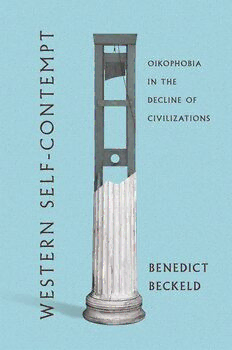
Western Self-Contempt: Oikophobia in the Decline of Civilizations PDF
Preview Western Self-Contempt: Oikophobia in the Decline of Civilizations
Western Self- Contempt Western Self-C ontempt Oikophobia in the Decline of Civilizations Benedict Beckeld Northern Illinois University Press An imprint of Cornell University Press Ithaca and London Copyright © 2022 by Cornell University All rights reserved. Except for brief quotations in a review, this book, or parts thereof, must not be reproduced in any form without permission in writing from the publisher. For information, address Cornell University Press, Sage House, 512 East State Street, Ithaca, New York 14850. Visit our website at cornellpress . cornell . edu. First published 2022 by Cornell University Press Printed in the United States of Amer i ca Library of Congress Cataloging- in- Publication Data Names: Beckeld, Benedict, author. Title: Western self-contempt : oikophobia in the decline of civilizations / Benedict Beckeld. Description : Ithaca [New York] : Northern Illinois University Press, an imprint of Cornell University Press, 2022. | Includes bibliographical references and index. Identifiers: LCCN 2021036968 (print) | LCCN 2021036969 (ebook) | ISBN 9781501763182 (hardcover) | ISBN 9781501763205 (pdf ) | ISBN 9781501763199 (epub) Subjects: LCSH: Political culture—Western countries—History. | Civilization, Western—Political aspects—History. | Social values— Western countries—History. | Western countries—Politics and govern- ment. | Western countries—Intellectual life. Classification: LCC JA75.7 .B434 2022 (print) | LCC JA75.7 (ebook) | DDC 306.209182/1—dc23 LC record available at https://lccn.loc.gov/2021036968 LC ebook record available at https://lccn.loc.gov/2021036969 In memoriam Baltsar Beckeld 1975–2018 fratris amantissimi. Spem in alium nunquam habui praeter in te. And when Fashion hath once Established, what Folly or craft began, Custom makes it Sacred, and ’twill be thought impudence or madness, to contradict or question it. John Locke, First Treatise of Government Si Sparte et Rome ont péri, quel état peut espérer de durer toujours ? Si nous voulons former un établissement durable, ne songeons donc point à le rendre éternel. Jean-J acques Rousseau, Du contrat social If the cultivation of the understanding consists in one thing more than in another, it is surely in learning the grounds of one’s own opinions. John Stuart Mill, On Liberty Contents Acknowl edgments ix Note on Translation xi Introduction 1 1. Oikophobia in Ancient Greece 15 2. Oikophobia as Relativism 32 3. Oikophobia in Rome 40 4. The Role of Religion 57 5. Oikophobia in France 70 6. Oikophobia in Britain 92 7. Oikophobia as Positivism 110 viii Contents 8. Oikophobia in the United States: The Past 117 9. Cyclical and Progressive Theory 130 10. Oikophobia in the United States: The Pre sent 152 11. The Confluence of the West 169 Epilogue: On Personal Freedom 197 Notes 217 Index 241 Acknowl edgments It is indicative of the re sis tance this book has faced that many of the spe- cific persons I wish to thank for supporting me during its creation and pro- motion have since died. I wrote this text in 2016 and 2017, with only editorial alterations and the occasional update since then, and the best efforts of a number of individuals to suppress it has meant that t hose who would most have rejoiced at its publication w ill not experience it. Very special thanks go to Professor Roger Scruton (1944–2020), vir ille spectabilis, who coined the term “oikophobia” and who, as a truly disinterested pursuer of truth, lent his support to my book even though it went far beyond his own exposition of this cultural phenomenon; and to Professor Ursula Schönheim (1929–2020), my erstwhile Latin professor and subsequently very dear friend, who read and commented on the first draft. I am also deeply grateful and indebted to the editorial team at Cornell University Press, and in par tic u lar to Amy Farranto, who worked tirelessly, and always with the ut- most kindness and professionalism, in ushering the manuscript to publication. My gratitude is also for t hose oikophobes, far too numerous to list by name,
